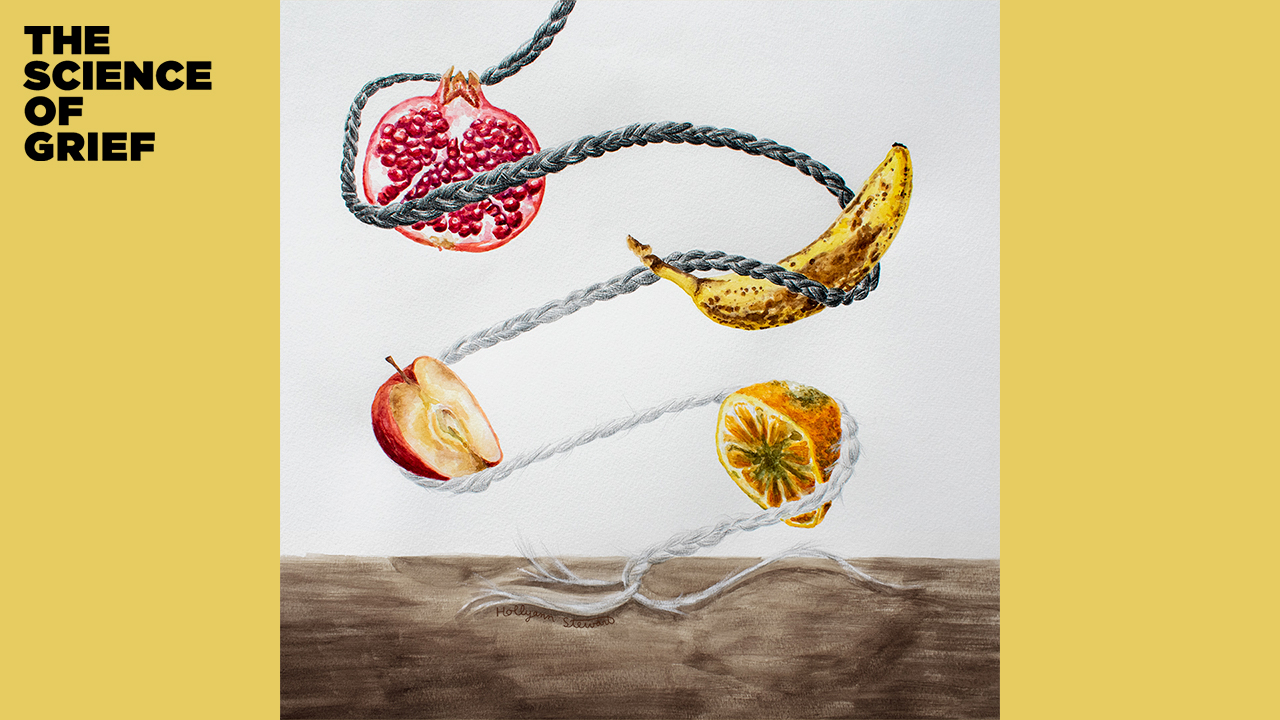Caring for Loved Ones with Dementia with Savanah Rayyan
Savanah Rayyan shares the deep bond she developed while caring for her grandmother, and how being with her while she had dementia made her the person she is today.

The Science of Grief, produced by WDET and Science Gallery Detroit, explores the stories, science and solutions around grief and mental health, making space for young adults to share their stories, but also lead the conversation.
Never miss an episode.
Subscribe where ever you listen to podcasts:
Apple Podcast — Spotify — NPR — Stitcher — Google Podcasts — TuneIn
Savanah Rayyan was born the youngest of 40 grandchildren in a large Arab American family.
Her grandma lived most of her life in Jordan. She was married at 13, and was the mother of 11 children. They moved to the United States when she was in her mid-60s.
A couple months before Savanah was born, her grandpa passed. And when Savanah was 5, her uncle died. Her grandma was in mourning and wore black for all of Savanah’s life.
“She was just living to live, there was no real purpose, because she had lost her son,” Savanah says.
Grandma had diabetes and her family shared caregiving responsibilities. Savanah would go to her grandma’s apartment twice a day to check on her with her dad.
“Something that gets me out of bed is just, working for what she didn’t have. And using the blessings that I have that she wasn’t able to have.” –Savanah Rayyan
Savanah would spend hours braiding her grandma’s hair. She would help cut vegetables. They just spent a lot of time together and cared for each other, Savanah says.
“I would literally just sit with her and watch her eat sometimes. It was the most simple relationship, but so much to it as well,” she says. “She was my person, and I was her person.”
But her health declined through Savanah’s childhood.
In 2010, Savanah’s grandma started hallucinating and was diagnosed with dementia.
Grandma only spoke Arabic, and Savanah barely spoke any Arabic. But her grandmother did know her name, and in later years when her condition was worse, it was a rare treat to hear her say Savanah’s name in her Arabic accent – “Sabanah.”
In 2017, Savanah’s grandma had a minor heart attack. After the heart attack, Grandma turned for the worse. Over the next three years, her condition worsened and she stopped eating. In October 2020, Savanah’s grandma passed away.
Gratitude for Lessons Learned
Savanah looks at the sacrifices her grandmother made throughout her life, and thinks about how lucky she is to have the opportunities and quality of life she now has.
Even though the loss of her grandma was painful, she thinks about the past and knows that the pain also comes with lessons learned.
“My grandma did not have the opportunities that I am so fortunate and blessed to have,” she says. “Something that gets me out of bed is just, working for what she didn’t have. And using the blessings that I have that she wasn’t able to have.”
While it was difficult, Savanah says she wouldn’t change anything.
“I would not change the entire process of my grandma,” she says. “With my grandma, it hurt, but it taught me something.”
Now, Savanah’s other grandma has dementia. She knows every day is going to be difficult, but she knows what to expect and is ready to be there for her like she was before.
Tips and Takeaways
Mental health practitioner and grief counselor Bonnie Wheeler spoke with Natasha T Miller about how family members can care for themselves while caring for loved ones with dementia.
- You can connect with a loved one with dementia over little things, especially things that might be tied to old memories, such as a listening to music or enjoying food.
- Try your best to avoid correcting someone’s memory “mistakes,” and know that correcting someone can be very distressing for someone with dementia. Sometimes, it is good to allow someone to tell their stories and live their memories, especially if it brings them comfort or happiness.
- When you’re grieving, allow yourself to take a break and process the loss of your loved one.
Previous Episodes of Science of Grief
- Navigating Gender Transitions and the Importance of Forgiveness with Alex Nitsche
- On Ghosting and Being Ghosted with Camille Rogers
- Challenging the Stigma Around Suicide with Felicia Frabis
- Learning to Cook and Savoring Life’s Moments with Jackie Garrett
- Living a Full Life with Half a Heart with Sierra Maybury
- Acknowledging Grief and Embracing Therapy with Joshua Watkis
- Setting Healthy Boundaries with Maria LoCicero
- Exploring Unexpected Loss with Aaron Burch
Seeking Help
While this podcast is meant to make space for sharing stories and solutions, it is not a substitute for professional help. If you have a mental health concern and need someone to talk to, please contact a mental health professional or your doctor.
If you are in a suicidal crisis or emotional distress, please call the National Suicide Prevention Lifeline: 800-273-8255.
The Science of Grief podcast is a collaboration between WDET and Science Gallery Detroit, and is supported by the Children’s Foundation of Michigan, MSUFCU and Science Sandbox.

Trusted, accurate, up-to-date.
WDET strives to make our journalism accessible to everyone. As a public media institution, we maintain our journalistic integrity through independent support from readers like you. If you value WDET as your source of news, music and conversation, please make a gift today.
